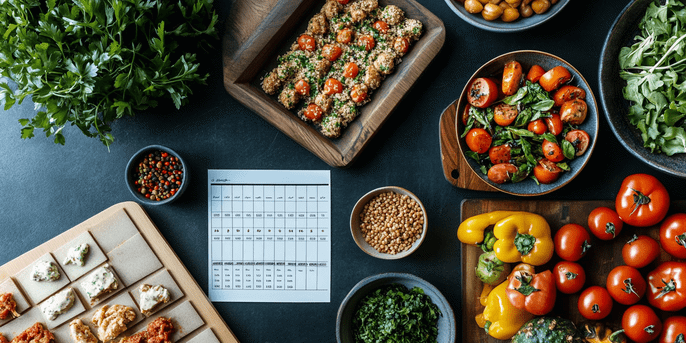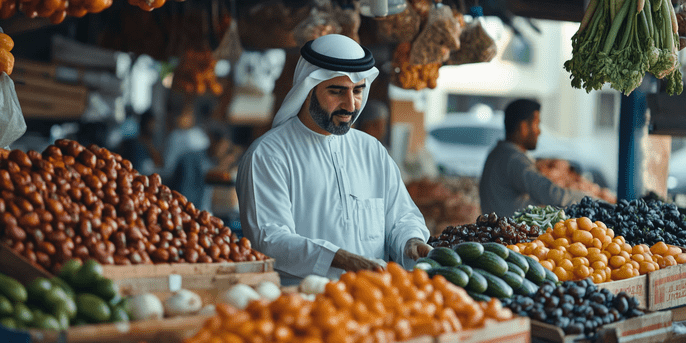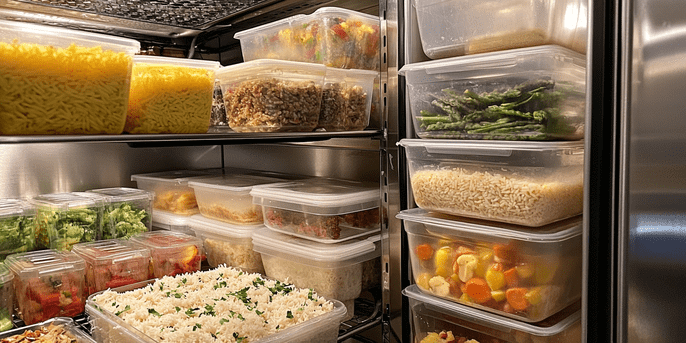Ramadan is a time of togetherness and reflection, but meal expenses can quickly rise. Smart planning and conscious spending can help you enjoy delicious iftar and suhoor meals without breaking the bank. With food prices increasing during the holy month, it's essential to adopt cost-effective shopping and cooking habits. Strategic meal planning and smart grocery shopping can significantly reduce expenses. Here are nine budget-friendly meal hacks to help you save money while preparing nutritious and satisfying dishes this Ramadan.
Plan Your Meals for the Whole Week

A well-structured meal plan eliminates waste and ensures cost efficiency. Meal planning reduces unnecessary trips to the store, which helps in avoiding impulse purchases. Structuring meals in advance allows for better use of ingredients and prevents food wastage. Knowing what to cook beforehand ensures you use available ingredients efficiently. Taking time to plan saves both money and effort during the busy Ramadan period.
- Create a weekly menu and plan nutritious meals using budget-friendly ingredients to reduce expenses.
- Check store flyers for Ramadan promotions at Lulu, Carrefour, and Union Coop to find the best discounts.
- Buy in bulk and store essential pantry items like rice, lentils, and dates to last the month and prevent frequent shopping.
Pro Tip: Use grocery apps like InstaShop and Talabat Mart to compare UAE prices and find the best deals before shopping.
Leverage Ramadan Promotions & Discount Codes
Many UAE supermarkets offer exclusive Ramadan discounts and bundle deals. Shopping strategically during promotions allows you to save more on essential groceries. Keeping track of sales and seasonal offers helps in making informed purchasing decisions. Ramadan discount bundles often include staple ingredients at a lower cost. Using discount codes and loyalty programs can help cut down on grocery bills significantly.
- Use cashback apps like Fetch Rewards or Emirates NBD cashback offers to get money back on your grocery purchases.
- Sign up for loyalty programs at local hypermarkets such as Carrefour, Lulu, and Spinneys to earn extra discounts and points.
- Apply SavePlus UAE promo codes on online grocery orders from platforms like Talabat Mart and InstaShop for additional savings.
Pro Tip: Plan shopping trips during Ramadan sale periods to maximize savings and buy staple ingredients in bulk for later use.
Choose Home-Cooked Over Ready-Made Meals
Cooking at home is healthier and significantly reduces food costs. Preparing meals from scratch ensures better control over ingredients and portion sizes. Pre-packaged foods often contain preservatives and excess additives, making them less nutritious. Home-cooked meals can be customized to include affordable yet wholesome ingredients. Batch cooking meals ahead of time reduces daily cooking stress and saves money.
- Batch cook and freeze suhoor and iftar meals to save time and avoid last-minute takeout expenses.
- Make your own sambousek and other snacks instead of purchasing pre-made frozen options, reducing unnecessary spending.
- Use staple ingredients like lentils, chickpeas, and oats to prepare filling and budget-friendly dishes throughout Ramadan.
Pro Tip: Invest in a slow cooker or air fryer to reduce cooking time, minimize energy consumption, and improve efficiency.
Shop at Local Farmers’ Markets

Local produce is fresher, more affordable, and supports UAE farmers. Visiting local markets instead of supermarkets can result in significant savings. Fresh produce is often cheaper when sourced directly from farmers, cutting out the middleman. Seasonal fruits and vegetables are typically available at reduced prices compared to imported goods. Shopping locally also ensures better quality ingredients for Ramadan meals.
- Visit Dubai’s Waterfront Market or Mina Market in Abu Dhabi for fresh, budget-friendly fruits and vegetables.
- Buy seasonal vegetables and fruits to get the best prices and ensure high nutritional value in daily meals.
- Compare market prices with supermarket rates to determine where you can buy the freshest produce at the lowest cost.
Pro Tip: Arrive early in the morning to get the freshest ingredients at bargain prices before the crowds arrive.
Reduce Meat Consumption with Alternatives
Meat is one of the biggest expenses in Ramadan meals. Consider alternatives. Plant-based meals provide necessary protein and nutrients without high costs. Choosing cost-effective protein sources reduces overall meal expenses. Cutting back on meat consumption also aligns with a more sustainable diet. Preparing vegetarian dishes can offer delicious and nutritious meal options.
- Use plant-based proteins such as lentils, beans, and tofu in dishes to save on high meat costs.
- Try cheaper cuts of meat like chicken thighs instead of expensive premium fillets for affordable yet flavorful meals.
- Buy frozen meats in bulk when promotions are available at Carrefour and Lulu to stock up at lower prices.
Pro Tip: Incorporate eggs and dairy into suhoor meals for protein-rich and budget-friendly alternatives to meat.
Opt for Energy-Efficient Cooking Methods
Lower electricity and gas bills by using smart cooking techniques. Choosing energy-saving appliances helps reduce monthly utility expenses. Cooking methods that consume less gas or electricity contribute to long-term savings. Pressure cooking and slow cooking require less active cooking time. Simple cooking adjustments can lead to noticeable reductions in household bills.
- Use a pressure cooker to prepare meals in half the time, conserving gas and reducing electricity costs.
- Try air frying instead of deep-frying to save oil, lower electricity usage, and achieve healthier meals.
- Prepare one-pot meals to minimize dishwashing, save water, and reduce overall cooking costs.
Pro Tip: Use residual heat by turning off the stove or oven slightly before cooking time ends to save energy.
Repurpose Leftovers to Minimize Waste

Avoid food waste by transforming leftovers into new dishes. Reusing leftovers creatively saves both time and money. Proper storage methods extend the freshness of previously cooked meals. Combining leftovers into new recipes prevents unnecessary disposal of food. Planning portion sizes helps reduce excessive cooking and waste.
- Turn excess rice into fried rice, rice pudding, or soup to make it into an entirely new meal.
- Use vegetable scraps for homemade stock or blended into soups, minimizing waste while adding nutrition.
- Repurpose bread leftovers into croutons, breadcrumbs, or stuffing for various dishes and snacks.
Pro Tip: Store leftovers in airtight containers and label them to ensure they are used before expiration.
Join Community Iftar Programs
Many mosques and community centers offer free iftar meals. Participating in these events fosters social connections while reducing meal costs. Volunteering at community kitchens allows you to contribute while receiving meals. Bulk buying with family or friends can also cut down costs. Leveraging shared resources makes iftar meals more affordable and fulfilling.
- Attend community iftars to experience the spirit of Ramadan while saving on meal expenses.
- Volunteer at food programs to give back to the community while benefiting from free meals.
- Share bulk grocery purchases with neighbors or friends to split costs and buy at lower prices.
Pro Tip: Check online community groups for announcements on free or subsidized iftar programs.
Use Ramadan-Exclusive Cashback & Rewards
Many UAE banks and stores provide cashback and rewards on spending. Cashback offers can be utilized to offset grocery and dining expenses. Loyalty points accumulated from grocery shopping can be redeemed for discounts. Flash sales during Ramadan present additional saving opportunities. Smart payment choices lead to greater financial benefits.
- Use credit cards that offer cashback incentives on Ramadan grocery purchases and dining expenses.
- Redeem points from supermarket loyalty programs to get discounts on future purchases.
- Sign up for Ramadan flash deals from online grocery platforms to receive exclusive promotions.
Pro Tip: Check bank offers that provide extra discounts for dining and grocery shopping during Ramadan.
Conclusion
By implementing these budget-friendly Ramadan cooking hacks, you can enjoy delicious and nutritious meals without overspending. Planning meals, leveraging discounts, and reducing food waste can make a significant difference in your budget. Embrace smart shopping habits and cost-effective cooking techniques to maximize savings. Make this Ramadan stress-free and affordable while still indulging in traditional and nourishing meals with family and friends.
Unlock the best deals and expert insights at SavePlus for a rewarding and budget-friendly shopping experience. Have fun shopping!
FAQ
How can I save money on Ramadan groceries in the UAE?
Use Ramadan discounts, shop at local markets, and apply cashback rewards on grocery purchases. Planning meals ahead and buying in bulk can also help.
Which UAE stores offer the best Ramadan food deals?
Carrefour, Lulu Hypermarket, Spinneys, and Talabat Mart offer exclusive Ramadan promotions and discounts on essential grocery items.
What are affordable suhoor meal options?
Oats, yogurt, eggs, and wholegrain bread are budget-friendly and filling choices that provide sustained energy throughout the fasting hours.
How can I reduce food waste during Ramadan?
Repurpose leftovers into new meals, store food properly to extend freshness, and freeze surplus dishes for later use to minimize waste.
Are there free iftar meals available in the UAE?
Yes, many mosques and community centers host free iftar gatherings open to the public, allowing individuals to break their fast while saving on expenses.






